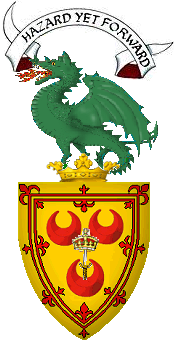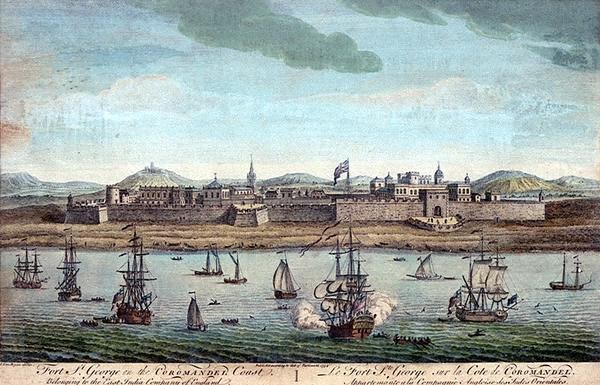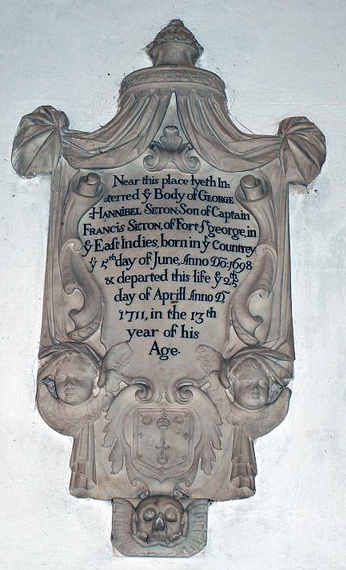|

Captain-Lieutenant
Francis Seton (Seaton), of the Grenadiers of Madras
 The
Garrison of Madras was formed by soldiers that were brought from
Bengal by Charnock, and formed into four companies, commanded by
Cap't-Lieut. James Bett, Lieut. Francis Seaton, Lieut. Zouch
Troughton and Lieut. Henry Sinclaire. Each company had an
Ensign, four Sergeants, four Corporals, and four Rounders. The
Garrison of Madras was formed by soldiers that were brought from
Bengal by Charnock, and formed into four companies, commanded by
Cap't-Lieut. James Bett, Lieut. Francis Seaton, Lieut. Zouch
Troughton and Lieut. Henry Sinclaire. Each company had an
Ensign, four Sergeants, four Corporals, and four Rounders.
P.C., vol. xv., 15th May, 1689. Seaton accompanied
Charnock from Bengal. Anne Seaton, who died in May,
1691, is described on her tombstone at St. Mary's as 'wife
to Francis Seaton, Captain of the Grenadiers of the
Garrison.' Seaton married secondly, in 1693, Hannah
MacKrith (or Mackreeth), who died in 1710. Her
monument also is preserved at St. Mary's. Two
companies were on duty daily. Half of one company
guarded the Inner Fort, and the other half was stationed at
St. Thomas' Gate, James Bulwark, Charles Point and the Sea
Gate. Of the other company, half was posted at the
Choultry Gate, Middle Gate and York, and Gloucester Points,
and the remaining half at the Bridge Gate and other gates
and bastions of the Black Town. A little later, Seaton's
company was converted into one of Grenadiers, with extra pay
and the sole duty of guarding the Inner Fort. Bett,
however, continued to be the senior in rank. He died
in 1692, and was succeeded in the command of the garrison by
Captain Francis Seaton. Succeeded James Betts as Captain of the Guard in 1692,
having obtained his first commission under him four years
earlier. He was a man of violent and overbearing temper.
Early in his career he was tried for drunkenness and for
wounding
a Portuguese and was reprimanded.
In 1698 he fought a duel with a brother officer and for this
was tried by court martial and cashiered, but later on he was
reinstated on apologizing to Pitt.
In 1703 he fought another duel with Stratford of the Civil
Service, just outside the Fort Walls. For this both were fined.
In 1704 he got into trouble with Pitt for marching his soldiers over the calico spread out to bleach on the Maidan.
He was suspended and Roach succeeded him. Seaton then
turned against Pitt, and started the scandalous story of the
diamond, which led to Pitt's recall.
In 1708 he was ordered home by the "Heathcote", and as
he refused to go was taken alongside by force. The Captain
(Tolson) refused to take anyone who did not go of his own
free will, and Seaton was sent on shore again.
In 1710 his wife died and he then left India for good. He
was twice married; both his wives are buried in the cemetery.
There is an entry in the baptismal register book
of St. Mary's
church which rebuts the accusation of Paganism on the part
of
Charnock. It is as follows: — "August 19th, 1689, Charnock,
Mary, Elizabeth and Katherine, daughters of Job Charnock,
baptised by J. Evans. Francis Ellis, Godfather, Ann Seaton
and
Margery Heathfield, Godmothers." Mrs. Seaton and Mrs. Heathfield were both Madras ladies. The latter has been
already mentioned as the widow of Robert Fleetwood. The
former was the wife
of Captain Francis Seaton who commanded the garrison. In
1694 one Thomas Gutteridge, whose person was wanted at
Madras, fled to the Portuguese town for security. The
Captaine Moor declined to extradite him unless Fort St.
George engaged to hold the man harmless. Higginson
determined on reprisals, and Lieut. Seaton was ordered to
arrest any San Thome Portuguese he might find in Madras, and
confine them in the Inner Fort pending instructions from the
Mayor.
ON THE COROMANDEL COAST The island is formed by the branching of the
Cooum
near the sea. It is a level piece of grass-land full of
historical interest. It was here that the contumacious
old soldier, Captain Francis Seaton, commandant of the
garrison, marched his troops over the Company's calicoes
to the great indignation of Governor Pitt. At that time
the Company had a large dyeing establishment on the
island by the edge of the river, where the washers could
work in safety under cover of the fort guns. It was
usual for the Governor to attend the fort church in state
every Sunday. He sat in the gallery, and reached his
seat by way of the outside staircase, which is still to be
seen. The duty of the commandant of the garrison was
to parade his troops and line the road. When the
Governor lived in the fort this was done without much
trouble, but when he chose to occupy the garden-house
by the river, the Sunday parade was a much more arduous
business.
The calicoes on one particular Sunday (1708) were
spread out in the sun after having been dipped. Pitt was
proceeding to church in his palanquin. Instead of finding
the road on the island lined with troops as usual, he saw
Seaton parading them all over the calicoes. His wrath
knew no bounds. Descending from his palanquin, he
went in person to the spot and ordered the men off, but
they had already done considerable damage. The next
day the commandant was called before the council to be
reproved. The reproof was not received with proper humility,
so he was suspended until the matter of ' breaking him altogether ' could be discussed.
There was further
friction between Seaton and Pitt, and it was decided in
council that the captain should be sent home by the first
ship sailing. This happened to be the Heathcote, commanded by Captain Tolson. When the time came to
embark Seaton refused to stir. The council ordered him
to be carried on board, and told off an officer with a file
of soldiers to carry the order into execution. It was
easier said than done. They succeeded in getting Seaton
through the surf and alongside of the ship ; but they could
not put him aboard without the assistance of hoisting
tackle, and this Captain Tolson refused to lend.
He said
that he was quite willing to receive anyone as a passenger
who desired to sail with him, but he would carry no one
by force. He asked Seaton if he wished to come on
board ; and, on his replying in the negative, the captain
ordered the boat to leave the ship's side. Against this
decision there was no appeal, for the commander of an East
Indiaman was a veritable monarch on board his own ship.
There must have been much amusement in the fort over
the incident and possibly some gratification, for Seaton
had friends and relatives on the council who sympathized
with him rather than with Pitt.
MONUMENTS OF THE OLD CEMETERY Legg, Hannah ; the wife of
John Legg, Esq,, one of the Council
and Mayor of Madras. She died in childbirth July 27th,
1717, in the twenty-third year of her age. (She was the
daughter of Francis Seaton by his wife Hannah Mackrith.
See was baptized July 1695, 21^^ was married Feb: 17 13.
See Seaton.)
Titus Gates.
Seaton, Anne; wife of Francis Seaton, Captain of the Grenadiers of the Garrison. She died May
16th, 1691. Note. — The legend is •' Hazard yet
Forward ", not upward.
Seaton, Elihu ; son of Francis and Anne. He died May 3rd,
1691.
Seaton, Francis; son of Francis and Anne. He died May
1st, 1692. Seaton, Hannah; wife of Captain Francis Seaton.
She died
Feb: 3rd, 1710. (There are some verses on her memorial
stone, the initial letters of each line form her name. Francis
Seaton married Hannah Mackrith as his second wife in
Feb: 1693.)
 NOTED AT WORMLEY CHURCH, HERTFORDSHIRE,
ENGLAND: NOTED AT WORMLEY CHURCH, HERTFORDSHIRE,
ENGLAND: Near the above, and directly
over the pulpit, is a white tablet with scrollwork and
draperied canopy in the form of mi Indian tent, based with a
skull and supported by cherubs, commemorating that—
"Near this place lyes interred
ye
Body of George Hannibal Seton, Son of
Captain Francis
Seton of fort S'
George in у
East Indies, born in y' Countrey y* 5th day
of June Anno Do 1698 & departed
this Life y° 25th day of
Aprill Anno D—1711, in
the 13th year of
his Age."
Note that the arms bear those of Seton of Barnes: three
crescents within a bordure flory-counter-flory, surmounted
by a sword hilted and pommeled upright supporting an
imperial crown.
Company's service 1692. Deputy Governor of Fort York, Bencoolen ; died
1712. His wife was dau. of Captain Francis Seaton and Ann, his wife. She
was bap. 31 Jan. 1688-9.
FORT ST. GEORGE
Legg, Hannah ; the wife of John Legg, Esq,, one of the Council
and Mayor of Madras. She died in childbirth July 27th,
1 717, in the twenty-third year of her age. (She was the
daughter of Francis Seaton by his wife Hannah Mackrith.
See was baptised July 1695, 21^^ was married Feb: 17 13.
See Seaton.)
| 
